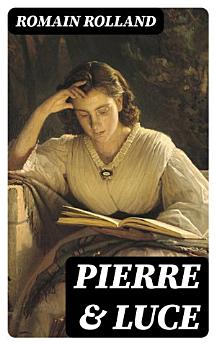Pierre & Luce
Romain Rolland
nov 2022 · DigiCat
Libro electrónico
75
Páginas
family_home
Apto
info
reportLas calificaciones y opiniones no están verificadas. Más información
Acerca de este libro electrónico
In "Pierre & Luce," Romain Rolland crafts a poignant narrative set against the backdrop of World War I, exploring the intersection of love and war through the lives of two young Parisian artists. Rolland employs a lyrical prose style, blending realism with impressionistic elements that capture the fleeting nature of their hopes and dreams amidst the chaos. The novel is steeped in the existential despair characteristic of early 20th-century literature, reflecting not only the devastating impact of the war but also the enduring power of human connection in the face of overwhelming odds. Romain Rolland, a Nobel laureate and passionate advocate for humanism and peace, was deeply influenced by the tumultuous socio-political landscape of his time. His background as a philosopher and a musician shaped his acute understanding of the human psyche and the ethical dilemmas faced by his protagonists. "Pierre & Luce" emerges as a significant work within Rolland's oeuvre, embodying his belief in the transformative power of love and the resilience of the human spirit amidst suffering. I highly recommend "Pierre & Luce" to readers who wish to delve into a profound exploration of love's endurance and the costs of war. Rolland's nuanced portrayal of intimacy, juxtaposed with the horrors of conflict, offers timeless insights that resonate with contemporary issues of connection and loss.
Acerca del autor
Romain Rolland (1866–1944) was an eminent French novelist, essayist, dramatist, and mystic, whose narrative style resonated with humanism and the quest for justice and peace. Rolland's profound influence on the European literary scene earned him the Nobel Prize in Literature in 1915, with an applaud for his oeuvre that 'exalts idealism, champions humanitarian concerns, and conveys the spirit of brotherhood amid diversity' (NobelPrize.org). Best known for his magnum opus, a ten-volume novel series titled 'Jean-Christophe', he depicted the life and struggles of a musical genius, which endeared him to readers as a writer dedicated to the exploration of individual consciousness within the larger socio-cultural spectrum. Another notable work, 'Pierre & Luce', provides a poignant narrative set against the grim backdrop of World War I, weaving a delicate tale of love and beauty among ruins. This novella is often celebrated for its lyrical style and the humanistic empathy that permeates Rolland's prose. As an ardent pacifist, Rolland's writings often intersected with his political convictions, which found expression in anti-war essays and activism. He was a correspondent and friend to influential figures such as Gandhi and Freud, showcasing his engagement with intellectual and cultural dialogues shaping the modern world. His literary style, characterized by rich emotional depth and philosophical inquiry, continues to inspire a pursuit of idealism and mutual understanding in literature and beyond.
Califica este libro electrónico
Cuéntanos lo que piensas.
Información de lectura
Smartphones y tablets
Instala la app de Google Play Libros para Android y iPad/iPhone. Como se sincroniza de manera automática con tu cuenta, te permite leer en línea o sin conexión en cualquier lugar.
Laptops y computadoras
Para escuchar audiolibros adquiridos en Google Play, usa el navegador web de tu computadora.
Lectores electrónicos y otros dispositivos
Para leer en dispositivos de tinta electrónica, como los lectores de libros electrónicos Kobo, deberás descargar un archivo y transferirlo a tu dispositivo. Sigue las instrucciones detalladas que aparecen en el Centro de ayuda para transferir los archivos a lectores de libros electrónicos compatibles.







